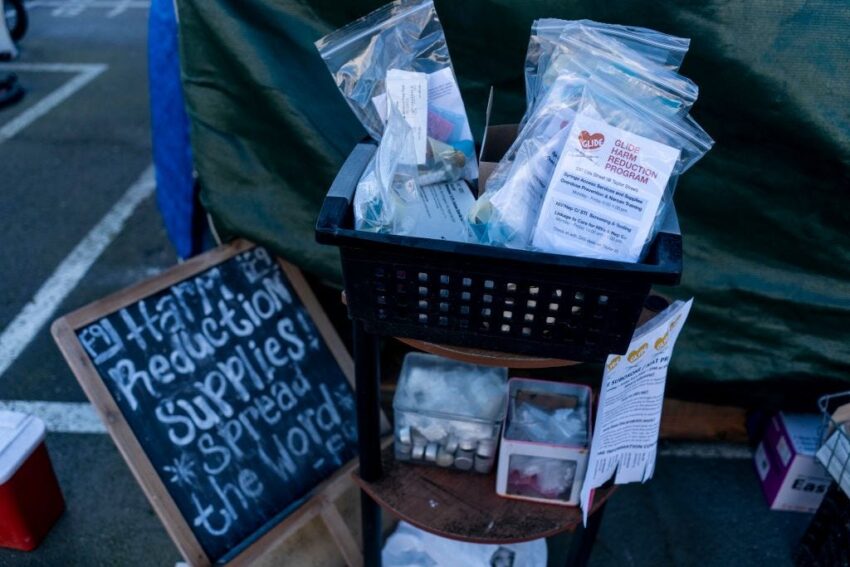I reported this story for the Times of London:
A group of residents and business owners in San Francisco are suing the city, claiming its permissive drug policies have destroyed their neighbourhood.
Five anonymous individuals and three businesses filed the lawsuit, claiming that the city had made the central Tenderloin neighbourhood a drug “containment zone” in which “drug dealers brazenly sell narcotics on the streets”.
The lawsuit claims that the city “effectively herds fentanyl users into the Tenderloin … with some organisations going so far as to deliver drug kits to their sidewalk encampments”. The claimants are demanding that a court grant a preliminary injunction to end the practice.
One of the claimants, “Jane Roe”, an immigrant housekeeper and mother of two, testified that “she encounters drug dealers, users openly injecting or smoking narcotics and people lying on the street who appear unconscious or dead”. She and her family were forced to step over syringes and human faeces littering the pavements, while “unleashed dogs” bark and growl at them, she said.
For years, the San Francisco Department of Public Health (SFDPH) has freely distributed needles, pipes, straws and foils to addicts as part of its “harm-reduction” strategy. Officials argue that clean pipes and foils encourage non-intravenous methods of consuming narcotics, preventing the spread of communicable diseases. The claimants say it has allowed public intoxication on a mass scale, leading to rampant crime and disorder.
Roe claimed that users had “threatened her with knives and hammers”. She said they had started bonfires on the street that aggravated her daughter’s asthma, then “threatened to cut her throat” when she asked them to stop.
At the Phoenix Hotel, which is one of three businesses involved in the lawsuit, “crowds of hostile people selling and using narcotics block passage of the sidewalks abutting the hotel” and “people who appear to be gang members now openly sell fentanyl and other potent drugs”.
The Tenderloin district is one of the city’s poorest neighbourhoods. It also has the highest density of children in San Francisco, according to census figures. The claimants blame the city for turning it into a containment zone, where the rules that govern the rest of the city do not apply.
Randy Shaw, executive director of the Tenderloin Housing Clinic, which manages many of the low-income hotels in the neighbourhood, said he once saw city contractors based at Glide Memorial Church pushing a pram filled with drug supplies and handing them out to addicts on the street. “This would not be tolerated for a day in most San Francisco neighbourhoods,” he said.
Daniel Lurie, San Francisco’s mayor, has taken a more hardline stance, implementing a rule in April that addicts can no longer receive free drug paraphernalia outdoors or without counselling.
The claimants say the change has made no difference and that addicts who receive items indoors simply take them down the street to get high outside.
The case also claims that the SFDPH has tried to hide or obfuscate its harm-reduction practices.
When asked in April whether the city had distributed fentanyl pipes, Hillary Kunins, the director of behavioural health services and mental health for the department, invoked her Fifth Amendment right to remain silent. So did Krista Gaeta, of its behavioural health division, when she was asked whether it was her office’s policy to distribute pipes and syringes.
However, Kunins admitted that an adolescent requesting drug paraphernalia from one of the city’s non-profit contractors could easily receive items under the mayor’s rules.
An attorney for the claimants asked: “A 14-year-old who comes into Glide in June 2025 and wants drug paraphernalia, so long as he or she is counselled, will receive it, true?”
Kunins replied: “I want to acknowledge the complexity here and say yes.”
Matt Davis, the lead attorney for the claimants, told The Times that the public health officials who were questioned were “secretive”. He added: “They use euphemisms. The attitude is that they know better than everyone else.”
The claimants say they are not looking for a payout, but want a preliminary injunction that bars the city from distributing drug kits. David Chiu, the city attorney, is fighting to allow the practice to continue.
Jen Kwart, the city attorney’s communications director, said: “The city has made great progress in reducing crime, disrupting open-air drug markets, getting people into treatment and addressing homelessness in the Tenderloin and across the city. We are reviewing the motion and will reply in court.
“We firmly believe that lawsuits of this kind do not improve conditions on our streets. The courts are not equipped to step into the shoes of elected policymakers and voters in order to craft broad strategies to address crime, substance use and homelessness.”
Davis said San Francisco’s harm-reduction strategy had allowed the city to claim that it is helping addicts, while actually making their problems worse. He said officials “encourage people to come, give them paraphernalia. Then people start OD’ing, they give them Narcan [an emergency antidote] and say, ‘I saved a life today.’
“Harm reduction,” added Davis, “is neighbourhood destruction.”
Click this link for the original source of this article.
Author: Leighton Woodhouse
This content is courtesy of, and owned and copyrighted by, https://leightonwoodhouse.substack.com and its author. This content is made available by use of the public RSS feed offered by the host site and is used for educational purposes only. If you are the author or represent the host site and would like this content removed now and in the future, please contact USSANews.com using the email address in the Contact page found in the website menu.






